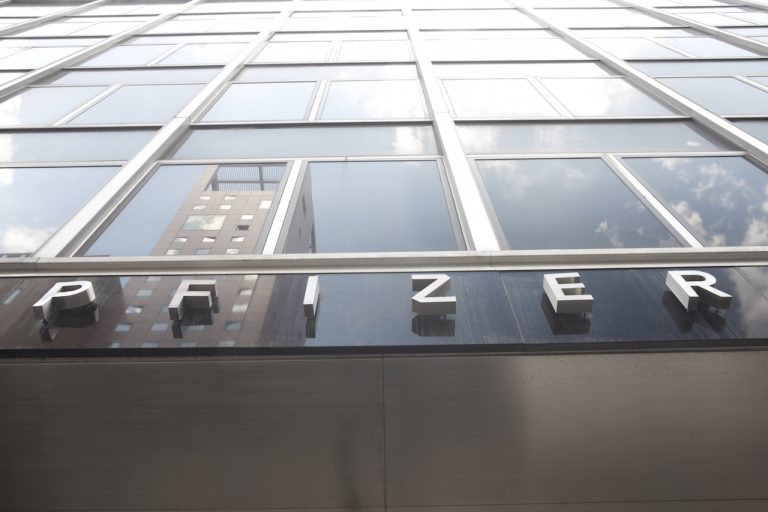Colombia’s national regulatory agency, the Superintendency of Industry and Commerce (SIC), has fined pharmaceutical company Pfizer $25,000 for allegedly inflating the price of several prescription drugs it sold in that country.1 2 On July 31, 2019, the agency stated:
The decision was taken after verifying information related to PFIZER SAS’ commercial operations between July and December 2016 in which it was established that it sold seven medicines in different presentations, at prices that exceeded… in percentages that would be between 4% and 651% to different clients of the institutional channel.1
According to a report by Becker’s Hospital Review, the SIC said that Pfizer sold its Xalatan (latanoprost ophthalmic) glaucoma eye drop solution for about $33 a unit—a price significantly higher than the $4 established by the agency. The agency also said Pfizer sold its Effexor (venlafaxine) antidepressant, known as a serotonin-norepinephrine reuptake inhibitor (SNRI), at 348 percent above the drug’s official price.2 3
In an article in Colombia Reports about the Pfizer fine, Adriaan Alsema notes that it is not the first time a U.S. pharmaceutical firm has attempted to manipulate the prescription drug market in Colombia. Alsema writes, “The association of American pharmaceutical companies on multiple occasions has tried to undermine Colombia’s health regulations in attempts to ban generic drugs in favor of much more expensive drugs patented in the U.S.1
Pfizer has a long history of violating laws regulating the sale and marketing of prescription drugs. In 2009, the company was fined $2.3 billion by the U.S. Department of Justice for fraud violations involving the marketing of the painkiller drug Bextra, the antipsychotic drug Geoden, the anti-epileptic drug Lyrica and the antibiotic Zyvox. The case was the largest health care fraud settlement in history.4
In 2016, Pfizer was fined $107 million by Great Britain’s Competition and Markets Authority (CMA) for hiking up the price of the anti-epileptic drug Epanutin (phenytoin sodium) by 2,600 percent. “This is the highest fine the CMA has imposed and it sends out a clear message to the sector that we are determined to crack down on such behaviour,” said CMA chairman Philip Marsden.5
Also in 2016, Pfizer was fined $190,000 by the U.S. Environmental Protection Agency (EPA) for failing to reveal information about hazardous chemicals—liquid ammonia and methylamine gas—used to make pharmaceutical ingredients and drugs at a manufacturing plant in Puerto Rico. According to a report by STAT, this was not the first time Pfizer had run “afoul of environmental laws at the plant.”6
In May 2014, Pfizer paid a civil penalty of nearly $318,000 after the EPA found that the drug maker violated the Clean Air Act by failing to have proper air pollution controls to prevent leaks of methylene chloride gas used in manufacturing.6
In 2018, Pfizer was fined $23.85 million by the Department of Justice to resolve claim that the company used a foundation as a “conduit to pay the copays of Medicare patients taking three Pfizer drugs, in violation of the False Claims Act.” The drugs included Sutent (sunitinib malate) and Inlyta (axitinib), used to treat renal cell carcinoma, and Tikosyn (dofetilide), used to treat hear arrhythmia (irregular heartbeat).7
“Pfizer used a third party to saddle Medicare with extra costs,” said U.S. Attorney Andrew E. Lelling. “According to the allegations in today’s settlement agreement, Pfizer knew that the third-party foundation was using Pfizer’s money to cover the co-pays of patients taking Pfizer drugs, thus generating more revenue for Pfizer and masking the effect of Pfizer’s price increases.”7
“Kickbacks undermine the independence of physician and patient decision-making, and raise healthcare costs,” said Acting Assistant Attorney General Chad A. Readler.7
Pfizer is a major manufacturer of vaccines. It was ranked fourth in the world in vaccine sales last year after GlaxoSmithKline, Merck & Co. and Sanofi. Among the Pfizer’s main products is Prevnar 13 for pneumococcal pneumonia and meningitis, which is not only the company’s best selling vaccine but also its best selling drug. Sales of Prevnar 13, alone, have generated about $23.4 billion in profits for Pfizer since 2015.8 9
Pfizer’s president of worldwide research, development and medical Mikael Dolsten has identified three vaccines under development that hold the most promise for the company. These include: a phase 3 immunization against Clostridium difficile infections, a phase 2 Staphylococcus aureus shot and a 20-valent pneumococcal vaccine that could supplant Prevnar 13.10
References:
1 Alsema A. Pfizer Colombia inflated drug prices up to 650%: industry watchdog. Colombia Reports Aug. 2, 2019.
2 Paavola A. Colombia fines Pfizer $25K for drug price inflation. Becker’s Hospital Review Aug. 5, 2019.
3 Effexor Tablet. WebMD.
4 Rubin R. Pfizer fined $2.3 billion for illegal marketing in off-label drug case. ABC News Sept. 2, 2009.
5 Reuters. Pfizer fined $107M for massive drug price hike. New York Post Dec. 7, 2016.
6 Silverman E. Pfizer fined again for violating environmental law at Puerto Rico plant. STAT Oct. 26, 2016.
7 Press Release. Drug Maker Pfizer Agrees to Pay $23.85 Million to Resolve False Claims Act Liability for Paying Kickbacks. U.S. Department of Justice May 24, 2018.
8 Top 10 Vaccine Manufacturers in the World 2018. technavio Sept. 27, 2018.
9 Shoot B. Pfizer’s Best-Selling Drug Is Actually a Vaccine—and Its Price Keeps Increasing. Fortune Feb. 5, 2019.
10 Sagonowsky E. Don’t sweat Prevnar’s problems, Pfizer R&D chief says. New vaccines are on their way FiercePharma Apr. 10, 2018.













3 Responses
I’m hoping only nice honest people work in Pfizer’s vaccine division.
Fines based on income will solve this. As long as it’s profitable to cover it up, these corporations will continue to do so. Add several zero’s to each and every fine. There are two different justice systems in this country, one for regular under class citizens, the other for the lords and kings of the corporate world, where nobody ever goes to jail and fines are rendered inconsequential by the size of their monopolistic companies.
Same stuff , different day. Cost of doing business for BigPharma